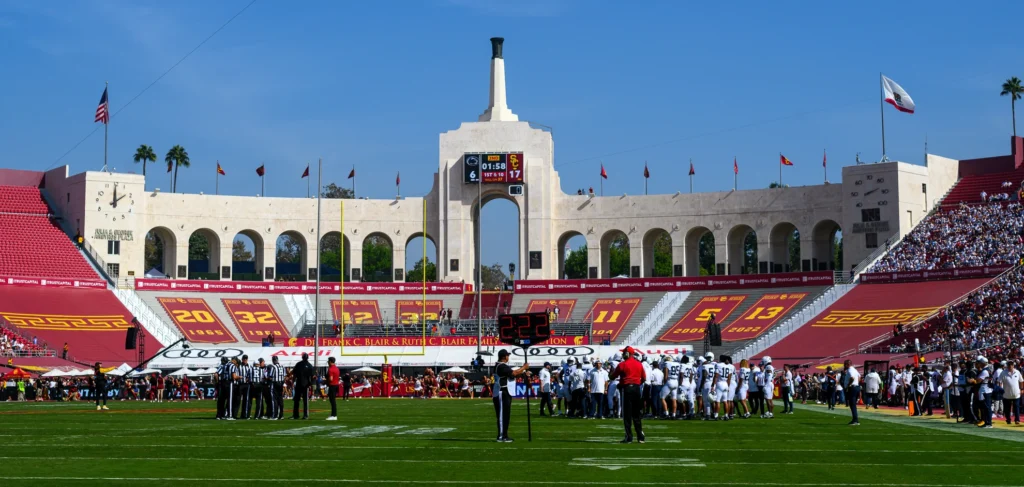
At the end of the game against USC, Pat Kraft was almost certainly amidst the celebratory mass of Penn State football players, coaches, associated hangers on and media members trying to capture or enjoy the immediate aftermath of Penn State’s 33-30 overtime victory in the Los Angeles Memorial Coliseum.
Some Penn State fans love that about Kraft — his emotion and passion, his vocal presence, his willingness to fight for Penn State. It’s an important part of their perception about how he’s doing his job as athletic director.
Still, if Kraft is doing his job well, the most important and long-lasting parts of his trip to Los Angeles last week (after a layover in Nashville, more on that later), came because he was asking questions and observing.
It was not just about the game. It was about the venue, too.
The 101-year-old coliseum, which is in the midst of a $315 million renovation effort, offered many examples of approaches, branding and upgrades and that could impact and inform what happens as Beaver Stadium going forward.
Most visible were the advertising opportunities USC has embraced. It was United Airlines Field. Ads for DirecTV and Truist Capital outlined the end zones. Longtime sponsor Arco was visible on scoreboard.
Plus, the premium seating or upgrade opportunities were obvious — at field level, at ends of the press box and just about everywhere possible.
The coliseum seats 77,500 for football (75,250 were at the Penn State-USC game) and the facility’s bones were in so many ways not intended to for sports in 2024. That has not slowed USC roll, though. State-of-the-art challenges require state-of-the-art approaches for future success.
It’s all about making money.
Earlier this year, Penn State approved a $700 million effort to improve and upgrade Beaver Stadium, which is decades younger than the coliseum no less prepared for the future in some ways. Plus, Beaver Stadium is the fourth-largest stadium in the world — and it’s 38 percent bigger than the coliseum.
Still, what the folks in Los Angeles and at USC, which has called the coliseum home since 1923, have implemented can transfer to other places. And even before last week’s trip, Kraft and Co. had plans.
Penn State created its Tunnel Club before last season and recently announced the rollout of ‘North Loge seating’ for upcoming games against Ohio State and Washington. Those packages of four tickets, one parking spot, attendant service for food and beverage, and overhead coverage from the weather, will cost a minimum $2,400.
It’s all about the money, first and foremost for Kraft, and that’s how it must be. That’s an athletic director’s primary job — creating value and finding revenue streams while ensuring financial opportunities going forward.
That was part of the Nashville trip. Administrators and leaders from Big Ten Conference and Southeastern Conference schools huddled together not far from the honkytonks on Lower Broadway last Thursday to discuss ways to increase their representation and leverage their strength in the College Football Playoff.
It’s a little ironic that the most powerful schools were meeting to discuss finding more power at a hotel located along the route Vanderbilt students used days early to drag a goalpost to the Cumberland River after their football team’s historic upset over Alabama. That was a compelling ultimate underdog story.
Then again, it’s an underdog that’s already a member of the SEC and already closer to the sport’s most powerful players than many other programs.
Maybe the Nashville trip was additional information gathering for Kraft. Maybe it was the start of another important fight. Maybe it was a little bit of both — just like the game at USC.
Penn State fans will see the result of all those efforts, and more, in the coming years. They’ve seen some already, with more coming during upcoming home games, and it’s a safe bet Kraft will front and center with all the changes.
If you’ve enjoyed this content, please subscribe to Stuff Somers Says With Steve on YouTube. Or join our newsletter by entering your email below.
